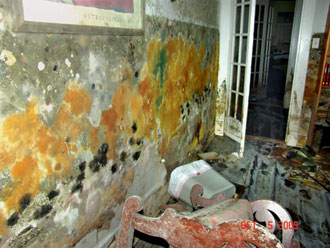More Mold Allergies After Katrina?
Researchers at the Tulane School of Public Health and Tropical Medicine have determined that there is no excess risk of adverse respiratory health problems for residents living in post-Katrina New Orleans.

Hurricane Katrina left its moldy mark in many New Orleans area homes, but studies by researcher Felicia Rabito show no lasting respiratory health effects from mold exposure after the storm. (Photo by Beth Poe)
“We undertook the study because ⦠there was tremendous concern about potential health effects associated with exposure to mold/dampness as a result of widespread exposure after Katrina,” says Felicia Rabito, associate professor of epidemiology, who headed the investigation.
Homes affected by water damage provide ideal breeding grounds for mold and dampness to thrive. Because of the known link between mold or dampness and respiratory effects, Rabito and her team of epidemiologists undertook the study to determine if residents living in New Orleans following the devastation of Hurricane Katrina were at higher risk for allergic mold sensitization.
The study examined 529 patients who came to the allergy, asthma and immunology clinic of the Ochsner Health System for mold reactivity between December 2005 and December 2008 and who had received a skin-prick test for any one of 24 types of mold. The participants in the study filled out a questionnaire regarding their level of exposure to mold and dampness at home and in the workplace.
More than half of the respondents had significant damage to their homes and 34 percent reported dampness or mold in their homes. The study found, however, that their mold sensitivity rates did not appear to differ between those exposed to mold and those not exposed. In addition, their mold sensitivity rates are not different from that of the U.S. population at large, Rabito says.
This study is good news for those worried about the potential health effects of living in New Orleans after Hurricane Katrina.
“Although there may be populations uniquely sensitive, the implications of this study and findings from our previous research are that in terms of respiratory health, it appears that there is no lasting effect of Katrina,” Rabito says.
The study is published in an article in the Journal of Allergy.
Michael Celone is a sophomore student at Tulane majoring in public health.
